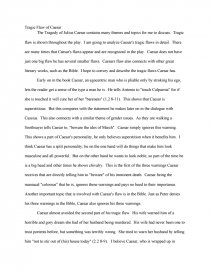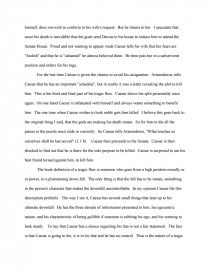Tragic Flaw of Julius Caesar
Essay by review • February 26, 2011 • Essay • 834 Words (4 Pages) • 2,517 Views
Tragic Flaw of Caesar
The Tragedy of Julius Caesar contains many themes and topics for me to discuss. Tragic flaw is shown throughout the play. I am going to analyze Caesar's tragic flaws in detail. There are many times that Caesar's flaws appear and are recognized in the play. Caesar does not have just one big flaw he has several smaller flaws. Caesars flaw also connects with other great literary works, such as the Bible. I hope to convey and describe the tragic flaws Caesar has.
Early on in the book Caesar, an egocentric man who is pliable only by stroking his ego, lets the reader get a sense of the type a man he is. He tells Antonio to "touch Calpurnia" for if she is touched it will cure her of her "bareness" (1.2 8-11). This shows that Caesar is superstitious. But this compares with the statement he makes later on in the dialogue with Cassius. This also connects with a similar theme of gender issues. As they are walking a Soothsayer tells Caesar to, "beware the ides of March". Caesar simply ignores this warning. This shows a part of Caesar's personality, he only believes superstition when it benefits him. I think Caesar has a split personality; he on the one hand will do things that make him look masculine and all powerful. But on the other hand he wants to look noble, so part of the time he is a big head and other times he shows chivalry. This is the first of the three warnings Caesar receives that are directly telling him to "beware" of his imminent death. Caesar being the maniacal "colossus" that he is, ignores these warnings and pays no heed to their importance. Another important topic that is involved with Caesar's flaw is in the Bible. Just as Peter denies his three warnings in the Bible, Caesar also ignores his three warnings.
Caesar almost avoided the second part of his tragic flaw. His wife warned him of a horrible and gory dream she had of her husband being murdered. His wife had never been one to trust portents before, but something was terribly wrong. She tried to warn her husband by telling him "not to stir out of (his) house today" (2.2 8-9). I believe Caesar, who is wrapped up in himself, does not wish to conform to his wife's request. But he listens to her. I speculate that since his death is inevidible that the gods send Decius to his house to induce him to attend the Senate House. Proud and not wanting to appear weak Caesar tells his wife that her fears are "foolish" and that he is "ashamed" he almost believed them. He then puts her in a subservient position and orders for his toga.
For the last
...
...


